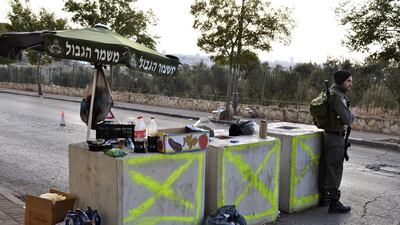JERUSALEM // Israel’s security crackdown in East Jerusalem is causing fatal delays in treating injured Palestinians, including an elderly woman who died after she was held up for an hour at a checkpoint while on her way to hospital.
The Israeli closures of Palestinian neighbourhoods – including roadblocks where motorists and pedestrians are searched, some near hospitals – are also delaying staff reaching their places of work, the directors of six Palestinian hospitals in occupied East Jerusalem said.
Palestinian officials said Israeli border police set up 29 roadblocks and internal checkpoints in East Jerusalem in the past week after the government authorised new measures to try to quell an escalation in violence.
In the past two weeks, 43 Palestinians, including assailants and demonstrators at anti-Israeli protests, and one Eritrean have been killed by Israeli security forces and civilians. Eight Israelis have also died in attacks by Palestinians amid escalating anger over suspicions of Jewish encroachment on the Al Aqsa mosque compound, Islam’s third-holiest site, and the rising number of Palestinian deaths.
Hoda Muhammad Darwish, 65, was suffering severe breathing problems after accidentally inhaling tear gas fired during clashes on Monday and was being rushed to hospital by her family when they were stopped at a new checkpoint outside their East Jerusalem neighbourhood of Issawiya.
Her son tried to bypass the dozens of cars lined up at the checkpoint but Israeli forces fired live bullets into the air and forced the Darwish family to wait in line. The family pleaded with the soldiers, who saw the woman struggling to breathe, but they delayed them until she was nearly dead, said Muhammad Abu Al Hummus, a spokesman for the Issawiya local residents committee.
The journey to the Makassed Hospital in the nearby A-Tur neighbourhood that would normally take no longer then 10 minutes took one hour.
“We were sorry to see that a woman who could have easily been saved has died at a checkpoint,” said Rafiq Husseini, the director of Makassed Hospital, one of six under the East Jerusalem Hospitals Network.
He said the roadblocks needed to removed immediately.
“A few minutes can be critical in saving a life. When she arrived she was dead, and this is going to continue if we don’t get rid of these blocks. We are appealing to the international community that this should end.”
A-Tur, also known as Mount of Olives, has been effectively closed off with roadblocks and checkpoints. Large concrete blocks sit on the main road that runs between Makassed and Augustus Victoria, the other hospital in the neighbourhood. The roadblock sits just outside the Augustus Victoria Hospital, creating a backup of traffic that prevents ambulances and staff vehicles from entering both hospitals.
A young Palestinian man was forced to lift up his shirt and stand on one leg while lifting his other arm as Israeli police checked for weapons from a distance.
According to Dr Husseini, since October 3, when two Israelis were stabbed and killed in the Old City of Jerusalem and subsequent clashes broke out across Israel and the occupied West Bank, the hospital has been inundated with patients from surrounding neighbourhoods.
“Most hospitals have also been stormed once, Makassed has been stormed twice by up to 30 soldiers with loaded weapons looking for people injured and wounded for whatever reason.”
He said the 800 staff had been unable to carry out their work properly due to the roadblocks and increased Israeli border police presence in the A-Tur neighbourhood.
Dina Nasser, head of infection prevention at August Victoria, said the move to cut off East Jerusalem was another in a wave of measures entrenching Israel’s occupation of East Jerusalem, in place since 1967.
"The reality is that staff are suffering here. One of my colleagues was forced to lift his shirt and pull down his trousers on a main road outside the hospital," Dr Nasser told The National.
Issawiya, the neighbourhood where Hoda and her family live, has been cut off since last Wednesday when Israeli soldiers placed concrete blocks across its main road, blocking one side and forcing cars to queue as they enter and exit the area. Residents are forced to undergo extensive searches, causing delays each time they enter and leave the community.
About 19,000 Palestinians live in Issawiya.
“Hospitals should be a place of healing, not of politics, there should be a right to get there and a right to movement without blockages and checkpoints regardless of gender or ethnicity,” said Munib Younan, a Lutheran bishop for Palestine and Jordan.
“We call for the immediate removal of the blockages outside hospitals. I believe there is no logic behind these checkpoints and I don’t believe they will bring security – it’s a form of collective punishment.”
Israeli police spokesman Micky Rosenfeld said he was not certain about the number of checkpoints in East Jerusalem but believed there were 12 to 14.
“Police are carrying out regular security checks at different areas in Jerusalem. If and whenever there is someone who has to get to hospital they can go through the checkpoints and receive medical treatment. Ambulances and emergency vehicles go through the new checkpoints with no difficulties.”
Asked about the death of Hoda Darwish, he replied: “I am not familiar with that, it sounds far-fetched”.
A week ago Israeli prime minister Benjamin Netanyahu and his security cabinet signed off on a package of security measures that included the authority to seal off Palestinian areas of Jerusalem.
The cabinet also approved revoking residency status for Palestinians who carry out attacks and fast-tracked the demolition orders of their family homes, allowing them to be torn down within days of an attack.
foreign.desk@thenational.ae

